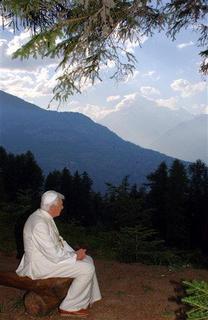
Sunday, July 31, 2005
Saturday, July 30, 2005
All Creation Our Dwelling

"Why, then, O Man, are you so worthless in your own eyes and yet so precious to God? Why render yourself such dishonor when you are so honored by Him? Why do you ask how you were created and do not seek to know why you were made?
"Was not this entire visible universe made for your dwelling? It was for you that the light dispelled the overshadowing gloom; for your sake was the night regulated and the day measured, and for you were the heavens embellished with the varying brilliance of the sun, the moon and the stars. The earth was adorned with flowers, groves and fruit; and the constant marvelous variety of lovely living things was created in the air, the fields, and the seas for you, lest sad solitude destroy the joy of God's new creation. And the Creator still works to devise things that can add to your glory. He has made you in His image that you might in your person make the invisible Creator present on earth; He has made you His legate, so that the vast empire of the world might have the Lord's representative. Then in His mercy God assumed what He made in you; He wanted now to be truly manifest in man, just as He had wished to be revealed in man as in an image. Now He would be in reality what He had submitted to be in symbol.
"And so Christ is born that by His birth He might restore our nature."
--from St Peter Chrysologus, in today's Office of Readings
Friday, July 29, 2005
The Beauty of Christ

"Is there anyone who does not know Dostoyevsky's often quoted sentence'. "The Beautiful will save us"? However, people usually forget that Dostoyevsky is referring here to the redeeming Beauty of Christ. We must learn to see Him. If we know Him, not only in words, but if we are struck by the arrow of his paradoxical beauty, then we will truly know him, and know him not only because we have heard others speak about him. Then we will have found the beauty of Truth, of the Truth that redeems. Nothing can bring us into close contact with the beauty of Christ himself other than the world of beauty created by faith and light that shines out from the faces of the saints, through whom his own light becomes visible."
---Joseph Cardinal Ratzinger, message to Commuion & Liberation 2002
Thursday, July 28, 2005
Wednesday, July 27, 2005
Singing--the Art Form for God
 Is singing the art-form of our response to God? What is the theology of singing? Does it matter that every morning we pray, "O come let us sing to the Lord?" Here's what Joseph Ratzinger had to say about it:
Is singing the art-form of our response to God? What is the theology of singing? Does it matter that every morning we pray, "O come let us sing to the Lord?" Here's what Joseph Ratzinger had to say about it:"The importance of music in biblical religion is shown very simply by the fact that the verb “to sing” (with related words such as “song”, and. so forth) is one of the most commonly used words in the Bible. It occurs 309 times in the Old Testament and thirty-six in the New. When man comes into contact with God, mere speech is not enough. Areas of his existence are awakened that spontaneously turn into song. Indeed, man’s own being is insufficient for what he has to express, and so he invites the whole of creation to become a song with him: “Awake, my soul! Awake, 0 harp and lyre! I will awake the dawn! I will give thanks to you, 0 Lord, among the peoples; I will sing praises to you among the nations. For your steadfast love is great to the heavens, your faithfulness to the clouds” (Ps 57:8f.). We find the first mention of singing in the Bible after the crossing of the Red Sea. Israel has now been definitively delivered from slavery. In a desperate situation, it has had an overwhelming experience of God’s saving power. Just as Moses as a baby was taken from the Nile and only then really received the gift of life, so Israel now feels as if it has been, so to speak, taken out of the water: it is free, newly endowed with the gift of itself from God’s own hands. In the biblical account, the people’s reaction to the foundational event of salvation is described in this sentence: “[T]hey believed in the Lord and in his servant Moses” (Ex 14:31). But then follows a second reaction, which soars up from the first with elemental force: "Then Moses and the people of Israel sang this song to the Lord” (i 5: i). Year by year, at the Easter Vigil, Christians join in the singing of this song. They sing it in a new way as their song, because they know that they have been “taken out of the water” by God’s power, set free by God for authentic life." [The Spirit of the Liturgy, (SF, CA: Ignatius, 2000), p. 136]
"The singing of the Church comes ultimately out of love. It is the utter depth of love that produces the singing. “Cantare amantis est”, says St. Augustine, singing is a lover’s thing. In so saying, we come again to the trinitarian interpretation of Church music. The Holy Spirit is love, and it is he who produces the singing. He is the Spirit of Christ, the Spirit who draws us into love for Christ and so leads to the Father. "[The Spirit of the Liturgy, (SF, CA: Ignatius, 2000), p. 142]
Tuesday, July 26, 2005
The Light of St James
 How graced we are at St James Cathedral--in fact, in the cathedral parish, we are given the light of all three of Our Lord's messianic offices. His priestly office shines through the splendour of the Liturgy, the daily round of prayer, the enactment of the sacrifice of the Mass, the very presence of Jesus Christ Himself in the blessed sacrament, all lifted up by the voices of music. His prophetic office shines through the articulation of His teaching in the eloquence of Fr Ryan, the apostolic witness of the Archbishop, the handing on of the Faith to children and together with adults, and the listening and longing of the catechumens. His kingly office shines forth in the organism of the communal life of the cathedral parish, in the faces of the people, perhaps most of all in the daily meal for the poor. Yes, this great house of God and gate of Heaven is a moment and location of light for us, and we are graced indeed!
How graced we are at St James Cathedral--in fact, in the cathedral parish, we are given the light of all three of Our Lord's messianic offices. His priestly office shines through the splendour of the Liturgy, the daily round of prayer, the enactment of the sacrifice of the Mass, the very presence of Jesus Christ Himself in the blessed sacrament, all lifted up by the voices of music. His prophetic office shines through the articulation of His teaching in the eloquence of Fr Ryan, the apostolic witness of the Archbishop, the handing on of the Faith to children and together with adults, and the listening and longing of the catechumens. His kingly office shines forth in the organism of the communal life of the cathedral parish, in the faces of the people, perhaps most of all in the daily meal for the poor. Yes, this great house of God and gate of Heaven is a moment and location of light for us, and we are graced indeed!
Monday, July 25, 2005
St James Day
 "Let us today hail the bright star which once made Compostella so resplendent with its rays that the obscure town became, like Jerusalem and Rome, a centre of attraction to the piety of the whole world. As long as the Christian empire lasted, the sepulchre of St James the Great rivalled in glory that of St Peter himself." (Dom Prosper Guerenger)
"Let us today hail the bright star which once made Compostella so resplendent with its rays that the obscure town became, like Jerusalem and Rome, a centre of attraction to the piety of the whole world. As long as the Christian empire lasted, the sepulchre of St James the Great rivalled in glory that of St Peter himself." (Dom Prosper Guerenger)
Sunday, July 24, 2005
Saturday, July 23, 2005
Dance of the Blessed
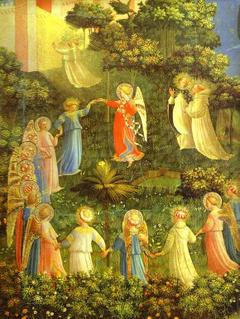
St Bridget of Sweden sang praises to Our Lord, as we read in today's Office of Readings, that are like a dance--wave after wave, turn after turn, movement after movement of praise after praise, each introduced by such invocations as "Blessed are You, my Lord Jesus Christ . . .", and then praising Him for the successive mysteries of His Love.
These dancing praises remind me of the great cosmic dance in C.S.Lewis' Perelandra, in which, in a similar fashion, the voices of the angels sing the beauty of God's Creation and His Love, each wave after wave, each movement after movement ending with the musical refrain, "Blessed be He!"
Perhaps Lewis was inspired by such medieval mystics as St Bridget, or perhaps they were both inspired by the same Music and the same Dance.
Lewis' hymn in Perelandra was reset into Spenserian stanzas by Ruth Pitter (found in C.S. Lewis: Poet pp. 275ff.); her first stanza sings of the same Music and the same Dance, the Art of God's Beauty:
"We do not wait till you are gathered in,
You of the little inward earths and low;
We speak not, we, of when it will begin.
Before forever and the long ago,
Before the stream of time began to flow,
We dance before His face rejoicingly.
We at the centre ever praise Him so:
For the great Dance have all things come to be,
And all was made that we might praise Him.
Blest be He!"
Friday, July 22, 2005
B16 at Mount Blanc
Speak Mary Declaring What Thou Sawest Wayfaring
 The passages offered to us by the Church about her, this Apostle to the Apostles, are rich & beautiful, so much more so than a recent popular novel and a soon to be released popular movie. The tradition that weaves together, probably inaccurately, threads of tales about several women--the woman taken in adultery, the woman who annointed Jesus, the sister of Martha--with the story of the first witness to the Resurrection is an old tradition; and we will not know the truth of it all this side of heaven. Certainly her witness to the Risen Lord is her chief act, for herself and for us. Speak Mary declaring what thou sawest wayfaring! "I have seen the Lord!" But all the other tales too, linked into one tapestry by the name "Mary", make her a figure of the Church herself--sinful, forgiven, loving, adoring. Her tale is thus our tale! This is no "code" but the beautiful imagery offered us by the Scriptures in the Church!
The passages offered to us by the Church about her, this Apostle to the Apostles, are rich & beautiful, so much more so than a recent popular novel and a soon to be released popular movie. The tradition that weaves together, probably inaccurately, threads of tales about several women--the woman taken in adultery, the woman who annointed Jesus, the sister of Martha--with the story of the first witness to the Resurrection is an old tradition; and we will not know the truth of it all this side of heaven. Certainly her witness to the Risen Lord is her chief act, for herself and for us. Speak Mary declaring what thou sawest wayfaring! "I have seen the Lord!" But all the other tales too, linked into one tapestry by the name "Mary", make her a figure of the Church herself--sinful, forgiven, loving, adoring. Her tale is thus our tale! This is no "code" but the beautiful imagery offered us by the Scriptures in the Church!
Thursday, July 21, 2005
What's He Writing?
 They say he's penning his first encyclical this week while he is on vacation. What will be his theme? What will be his focus? I imagine whatever it is--the Church, the Liturgy, ecumenism, truth vs relativism, Beauty--it will be from the perspective of his Petrine Ministry, that is, witnessing to Jesus Christ.
They say he's penning his first encyclical this week while he is on vacation. What will be his theme? What will be his focus? I imagine whatever it is--the Church, the Liturgy, ecumenism, truth vs relativism, Beauty--it will be from the perspective of his Petrine Ministry, that is, witnessing to Jesus Christ.
Wednesday, July 20, 2005
Manna from Heaven
 Gathering the daily Manna, the Bread of Heaven, the food in the wilderness, the children of Israel ate and had their fill, protected as they were by God's loving providence. This we hear in the first reading, as the Liturgy of the Word nowadays works its way through Exodos. And it's not just a story, wonderful story that it is. Anymore than the lembas on which Frodo & Sam survive is just a story, wonderful story that it is. Such stories point to a reality in our lives that is very real indeed--the daily Manna, the Bread of Heaven, the miraculous lembas that is our daily bread--Jesus Christ Himself, Who comes to us in the Eucharist.
Gathering the daily Manna, the Bread of Heaven, the food in the wilderness, the children of Israel ate and had their fill, protected as they were by God's loving providence. This we hear in the first reading, as the Liturgy of the Word nowadays works its way through Exodos. And it's not just a story, wonderful story that it is. Anymore than the lembas on which Frodo & Sam survive is just a story, wonderful story that it is. Such stories point to a reality in our lives that is very real indeed--the daily Manna, the Bread of Heaven, the miraculous lembas that is our daily bread--Jesus Christ Himself, Who comes to us in the Eucharist."Give us this day our daily bread" we pray three times a day, at Morning & Evening Prayer, but most of all at Holy Mass. How wonderful it is to go to Mass daily, to hear the Word of God and then to eat the Word of God, the gift of Christ Himself to us.
Tuesday, July 19, 2005
What He Says About Vacation

"In the world in which we live it is almost a requirement to be able to restore body and spirit, especially for city dwellers, where the often frenetic lifestyle leaves little time for silence, reflection or the soothing contact with nature. Vacations are also a period in which one can dedicate more time to prayer, reading and meditation on the profound meaning of life, in the serene environment of one's own family and loved ones."
"Through contact with nature, people again find their true dimension, they rediscover themselves as creatures, small but at the same time unique, and 'capable of God' because of an interior openness to Infinity. Driven by the need for meaning which rises from their hearts, they perceive in the surrounding world the signs of goodness and of Divine Providence and, almost naturally, they become open to praise and prayer."
(from his Sunday Angelus message)
Monday, July 18, 2005
When Ratzinger Was Young
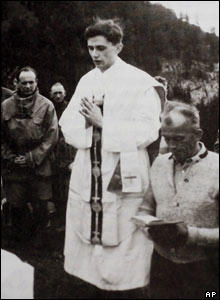 He could not be more charming! Here, he describes his ordination to the priesthood, at the Cathedral at Freising on the Feast of Sts Peter & Paul in 1951:
He could not be more charming! Here, he describes his ordination to the priesthood, at the Cathedral at Freising on the Feast of Sts Peter & Paul in 1951:"We were more than forty candidates, who, at the solemn call on that radiant summer day, which I remember as the high point of my life, responded 'Adsum', Here I am! We should not be superstitious; but, at the moment when the elderly archbiship laid his hands on me, a little bird--perhaps a lark--flew up from the high altar in the cathedral and trilled a little joyful song. And I could not but see in this a reassurance from on high, as if I heard the words 'This is good, you are on the right way.' "
Sunday, July 17, 2005
Pope Benedict on Singing
 This morning I found this passage in a collection of speeches and essays by Joseph Ratzinger called A New Song for the Lord: it's one of the most beautiful things I've ever read!
This morning I found this passage in a collection of speeches and essays by Joseph Ratzinger called A New Song for the Lord: it's one of the most beautiful things I've ever read!"At the end of my reflections I would like to note a beautiful saying of Mahatma Gandhi that I recently found in a calendar. Gandhi refers to the three habitats of the cosmos and how each of these provides its own mode fo being. The fish live in the sea and they are silent. The animals of the earth scream and shout; but the birds, who habitat is the heavens, sing. Silence is proper to the sea, shouting to the earth, and singing to the heavens. Human beings have a share in all three of them. They carry the depths of the sea, the burden of the earth, and the heights of the heavens in themselves, and for this reason all three properties also belong to them: silence, shouting, and singing. Today--I would like to add--we see that only the shouting is left for those humans without transcendence since they only want to be earth and also try to make the heavens and the depths of the sea into their earth. The right liturgy, the liturgy of the communion of saints, restores totality to these people. It teaches them silence and singing again by opening to them the depths of the sea and teaching them to fly, the angels' mode of being. It brings the song buried in them to sound once more by lifting up their hearts. Indeed, we can now even turn this around and say: One recognizes right liturgy by the fact that it liberates us from ordinary, everyday activity and returns to us once more the depths and the heights, silence and song. One recognizes right liturgy in that it has a cosmic, not just a group, character. It sings with the angels. It is silent with the expectant depths of the universe. And that is how it redeems the earth."
Saturday, July 16, 2005
Milestones
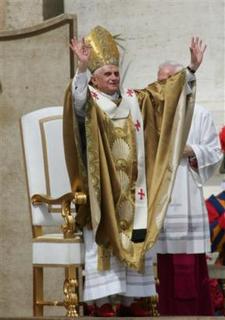 Lately I've been enjoying Joseph Ratzinger's Milestones: Memoires 1927-1977. What a charming, intelligent, articulate, loving, faithful, beautiful man he is!
Lately I've been enjoying Joseph Ratzinger's Milestones: Memoires 1927-1977. What a charming, intelligent, articulate, loving, faithful, beautiful man he is! For example, he recalls the day of his episcopal consecration thus: "I experienced what a sacrament is--that what occurs in a sacrament is a reality."
We are so lucky to be living in the new Springtime of the Church!
For Our Lady of Mount Carmel
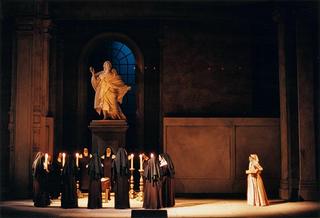 Poulenc's opera Dialogues of the Carmelites sings the story of Blanche, a young, frightened sister who learns Faith, Hope, and Love during the French Revolution.
Poulenc's opera Dialogues of the Carmelites sings the story of Blanche, a young, frightened sister who learns Faith, Hope, and Love during the French Revolution.In the last scene, the Carmelite nuns go to their death while singing the Salve Regina, and Blanche is inspired to give the witness of her life and to join them.
Art gives us a glimpse of the Beauty of God!
Thursday, July 14, 2005
Benedict for the New Pentecost
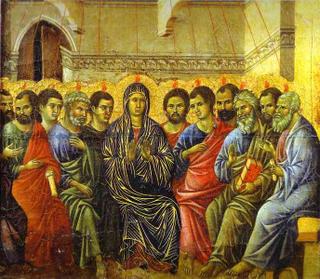 St Benedict, in his Rule, roots everything we do in prayer. "First of all, every time you begin a good work, you must pray to Him most earnestly to bring it to perfection." Perhaps this is the first counsel we Christians in the world should take up--in the world, in our work, in our professions, in our daily tasks, in our interactions with other people, in our words and deeds, in our secular investment, we should first pray. Daily. Hourly.
St Benedict, in his Rule, roots everything we do in prayer. "First of all, every time you begin a good work, you must pray to Him most earnestly to bring it to perfection." Perhaps this is the first counsel we Christians in the world should take up--in the world, in our work, in our professions, in our daily tasks, in our interactions with other people, in our words and deeds, in our secular investment, we should first pray. Daily. Hourly.And the Church gives us ways to do this--not least, the Liturgy of the Hours, with its daily round of psalms, readings, and intercessions. Morning and evening we offer to God His own Word in prayer. Every morning:
"O Lord, open my lips!"
"And my mouth will proclaim Your praise!"
And hourly:
"O God, come to my assistance!"
"O Lord, make haste to help me!"
As St Benedict teaches, this is the first thing we should do--rouse ourselves up in prayer to our Maker, in praise, thanksgiving, and petition. As he says, "Let us open our eyes to the light that comes from God, and our ears to the voice from heaven that every day calls out this charge--'Today, if you hear the voice of the Lord, do not grow stubborn!'"
Pope Benedict XVI too calls us to prayer, to orient ourselves toward God, and thus to experss the dignity of what it is to be human. So let's do this--Oremus! Let's pray in our work, our tasks, our involvement in the world.
Wednesday, July 13, 2005
Benedict for Us
So on this last Sunday, Pope Benedict spoke about St Benedict, about his mission to create new Christian communities that bridged the classical world of Rome and the new semi-Christian barbarian German and Slavic world, forming a path through the new dark ages. How can we do so? How can we live in our contemporary American secular world, in our jobs, our homes, our neighborhoods, our networks, our worldly real historical, social, visible lives--and do so as Christians?
Somehow we must--Pope Benedict insists. Somehow we must pray, live and love--in the spirit of St Benedicts a real Christian community!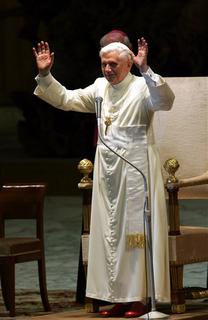

So how do we find our new form of Christian community? To begin with, we might take a look at the great religious orders of the past, each inspired by the charism of its founder. The Benedictines, the Franciscans, the Dominicans, the Jesuits--all these live a real, historical, visible Christian community, responding to God's call, in a manner suited for their time, in love of God, and in loving service to other people. So how do we do that? Some of us oculd knock on a monastery door, serve in a Franciscan soup kitchen, email the Dominicans, or go on an Ignatian retreat--but how can we live the life of Christian community, the evangelical call, love of God and service to others in the world of our work, our lives in the secular world, in the professions? This seems to be the task, the calling, of the great Movements of today--in the spirit of Benedict, living the Christian life in the world.
And we have a witness, a pointer, a living invitation so to do! Pope Benedict XVI himself!
Somehow we must--Pope Benedict insists. Somehow we must pray, live and love--in the spirit of St Benedicts a real Christian community!


So how do we find our new form of Christian community? To begin with, we might take a look at the great religious orders of the past, each inspired by the charism of its founder. The Benedictines, the Franciscans, the Dominicans, the Jesuits--all these live a real, historical, visible Christian community, responding to God's call, in a manner suited for their time, in love of God, and in loving service to other people. So how do we do that? Some of us oculd knock on a monastery door, serve in a Franciscan soup kitchen, email the Dominicans, or go on an Ignatian retreat--but how can we live the life of Christian community, the evangelical call, love of God and service to others in the world of our work, our lives in the secular world, in the professions? This seems to be the task, the calling, of the great Movements of today--in the spirit of Benedict, living the Christian life in the world.
And we have a witness, a pointer, a living invitation so to do! Pope Benedict XVI himself!
Tuesday, July 12, 2005
Benedict for the Future

How does the crisis of our present time require a new Benedict? Somehow, we must find a way to put into practice the spirit of Benedict--the daily round of prayer, of the Liturgy of the Hours, of the Eucharist, as the grounding of our lives and the sanctification of Time and Space as Hour and Place; the community of life together, in love, in mutual dignity and respect, and forgiveness, and indeed obedience; and listening to the Word of Christ and the teaching of the Church. And we must find new ways of Christian community so to do this. Else we perish. But survival itself must not be our goal: rather, in the spirit of St Benedict and in the spirit of Pope Benedict XVI, we must prefer Christ above all things and build our lives around him!
Monday, July 11, 2005
Benedict for Today
 Alasdair MacIntyre put it prophetically at the very end of After Virtue: "It is always dangerous to draw too precise parallels between one historical period and another; and among the most misleading of such parallels are those which have been drawn between our own age in Europe and North America and the epoch in which the Roman empire declined into the Dark Ages. None the less certain parallels there are. A crucial turning point in that earlier history occurred when men and women of good will turned aside from the task of shoring up the Roman imperium and ceased to identify the continuation of civility and moral community wiht the maintenance of that imperium. What they set themselves to achieve instead--often not recognising fully what they were doing--was the construction of new forms of community within which the moral life could be sustained so that both morality and civility might survive the coming ages of barbarism and darkness. If my account of our moral condition is correct, we ought also to conclude that for some time now we too have reached that turning point. What matters at this stage is the construction of local forms of community within which civility and the intellectual and moral life can be sustained through the new dark ages which are already upon us. And if the tradition of the virtues was able to survive the horrors of the last dark ages, we are not entirely without grounds for hope. This time however the barbarians are not waiting beyond the frontiers; they have already been governing us for quite some time. And it is our lack of consciousness of this that constitutes part of our predicament. We are waiting not for a Godot, but for another--doubtless very different--St Benedict."
Alasdair MacIntyre put it prophetically at the very end of After Virtue: "It is always dangerous to draw too precise parallels between one historical period and another; and among the most misleading of such parallels are those which have been drawn between our own age in Europe and North America and the epoch in which the Roman empire declined into the Dark Ages. None the less certain parallels there are. A crucial turning point in that earlier history occurred when men and women of good will turned aside from the task of shoring up the Roman imperium and ceased to identify the continuation of civility and moral community wiht the maintenance of that imperium. What they set themselves to achieve instead--often not recognising fully what they were doing--was the construction of new forms of community within which the moral life could be sustained so that both morality and civility might survive the coming ages of barbarism and darkness. If my account of our moral condition is correct, we ought also to conclude that for some time now we too have reached that turning point. What matters at this stage is the construction of local forms of community within which civility and the intellectual and moral life can be sustained through the new dark ages which are already upon us. And if the tradition of the virtues was able to survive the horrors of the last dark ages, we are not entirely without grounds for hope. This time however the barbarians are not waiting beyond the frontiers; they have already been governing us for quite some time. And it is our lack of consciousness of this that constitutes part of our predicament. We are waiting not for a Godot, but for another--doubtless very different--St Benedict."
Sunday, July 10, 2005
The Word of God Like Rain Upon the Earth
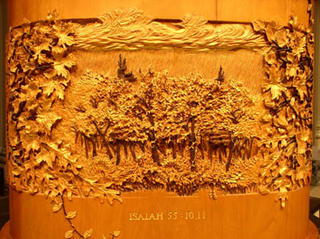 Art makes the Word visible!
Art makes the Word visible!Just as Jesus Christ, the Incarnate Word of God, makes God visible, so too the Art of Man, sub-created after God's example, makes the Beauty of God visible. (Incarnation--Icon--Art!)
Here we see the Word of God carved in wood and expressing the reality of the invisible!
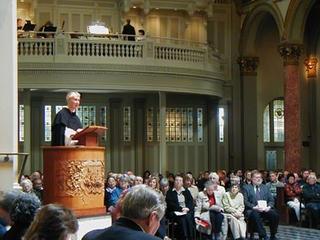
The Ambo at St James Cathedral in Seattle beautifully shows forth the metaphor in today's first reading from Isaiah--the eloquent carving by Randall Rosenthal places Isaiah's metaphor on the very pulpit from which the spoken Word and Preaching goes forth:
"Just as from the heavens the rain and snow come down and do not return there till they have watered the earth, making it fertile and fruitful, giving seen to the one who sows and bread to the one who eats, so shall my word be that goes forth from my mouth; my word shall not return to me void, but shall do my will, achieving the end for which I sent it."
We see this in action, as Timothy Ratcliffe OP preaches from this ambo and the people of St James Cathedral listen. How do we listen to the Word of God? How do we take it in deeply? How do we let it grow in our lives?
Magnificat Summer
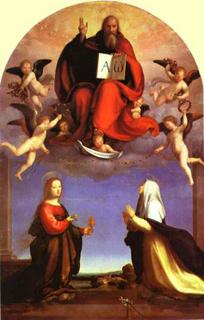
Just the other day, the beautiful daily prayer-monthly, Magnificat, offered a reading from St Catherine of Siena that sang with beauty!
"Love, love, love one another! Be glad, be jubilant! Summertime is coming! God showed his marvels in such a way that my soul seemed to be outside my body and was so overwhelmed with joy that I can't really describe it in words."
Magnificat is a beautiful gift--a lovely monthly just the right size for a coat pocket, with psalms and readings for morning and evening, daily meditations from the saints or great theologians, and the lessons for the daily Liturgy of the Word, along with the Mass, essays, family prayers, and gorgeous and spiritually enriching artwork!
Saturday, July 09, 2005
Our Lady & the Church

I picked up a little book from Ignatius Press this week, because it had an inviting blurb: "This marvelous work is one of the most important theological rediscoveries of the twentieth century"--Joseph Cardinal Ratzinger. Well, the book is Hugo Rahner's Our Lady and the Church. Its beautiful theme explores how we must see the Church in Our Lady and Our Lady in the Church. Fr Rahner goes through the mysteries of Our Lady--her Immaculate Conception through her Glorious Assumption--and in the words of St Isaac of Stella: "Thus it is that in the inspired Scriptures, what is said in the widest sense of the Virgin Mother the Church is said in a special sense of the Virgin Mary. And what is spoken of the Virgin Mother Mary in a personal way can rightly be applied in a general way to the Virgin Mother the Church. But every faithful soul is in a sense the bride of the Word of God, the Mother of Christ, His daughter and His sister, virgin yet a mother. And moreover whatever is said of God's eternal wisdom itself can be applied in a wide sense to the Church in a narrower sense to Mary and in a particular way to every faithful soul."
Friday, July 08, 2005
Another Look at the Fat Man
 Several of you have asked about the Fat Man. Amongst other things, he was enamoured of the spirit of the child. In fact, he was as much of a child, a little child, a little tiny child, as he was a Fat Man. In a way of putting it, one might say he was a little tiny Fat Man, or perhaps a great fat little tiny child. He knew that the fatter he was, the smaller he was. He knew that his fatness was a declaration against the Manichees, and he knew that his littleness was a proclamation against the moderns. He knew that he was one of those that a Greater One had invited to be suffered to come unto Him.
Several of you have asked about the Fat Man. Amongst other things, he was enamoured of the spirit of the child. In fact, he was as much of a child, a little child, a little tiny child, as he was a Fat Man. In a way of putting it, one might say he was a little tiny Fat Man, or perhaps a great fat little tiny child. He knew that the fatter he was, the smaller he was. He knew that his fatness was a declaration against the Manichees, and he knew that his littleness was a proclamation against the moderns. He knew that he was one of those that a Greater One had invited to be suffered to come unto Him.
Thursday, July 07, 2005
Lorenzo: Patron of Bad Jokes
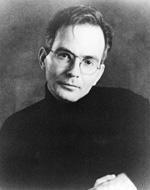 So they say that when they were putting St Lorenzo on the Grill, so that he could offer witness with his life, he said to his tormentors: "Turn me over--I'm done on this side!"
So they say that when they were putting St Lorenzo on the Grill, so that he could offer witness with his life, he said to his tormentors: "Turn me over--I'm done on this side!"He may have: but if he didn't, he should have. The saints always had good humour. They were, as Chesterton noted, full of levity. Satan, however, fell by the force of gravity.
A similar point is made by Hans Urs von Balthasar toward the end of his The Office of Peter and the Structure of the Church--that the saints, amongst other notes, could be noted by their humour.
The Wind of the Spirit Upon Benedict
 So have you been reading the homilies and speeches of our new Pope Benedict XVI? It is a joy to live in this time, this new springtime of the Church. From his first address after his election, he has uttered with a musical eloquence a beautiful outline of the figure of the Church--an ecclesiology of great beauty and radiance. For example, listen to his words, spoken on the Solemnity of Sts Peter & Paul: "The aim of the mission is a humanity that has itself become a living glorification of God, the true worship that God expects. This is the most profound meaning of catholicity--a catholicity that has already been given to us and toward which we must continue to orient ourselves. Catholicity does not express only a horizontal dimension, the coming together of many people in unity; it also expresses a vertical dimension: only by turning our gaze to God, only by opening ourselves to Him can we truly become only one." Listen to each phrase! We can hear the breath of the Holy Spirit singing and breathing through them--a living glorification of God, horizontal and vertical, many people in unity, turning our gaze to God. Listen--and let's live it!
So have you been reading the homilies and speeches of our new Pope Benedict XVI? It is a joy to live in this time, this new springtime of the Church. From his first address after his election, he has uttered with a musical eloquence a beautiful outline of the figure of the Church--an ecclesiology of great beauty and radiance. For example, listen to his words, spoken on the Solemnity of Sts Peter & Paul: "The aim of the mission is a humanity that has itself become a living glorification of God, the true worship that God expects. This is the most profound meaning of catholicity--a catholicity that has already been given to us and toward which we must continue to orient ourselves. Catholicity does not express only a horizontal dimension, the coming together of many people in unity; it also expresses a vertical dimension: only by turning our gaze to God, only by opening ourselves to Him can we truly become only one." Listen to each phrase! We can hear the breath of the Holy Spirit singing and breathing through them--a living glorification of God, horizontal and vertical, many people in unity, turning our gaze to God. Listen--and let's live it!
Wednesday, July 06, 2005
Multiplicity & Unity in the Eucharist

Many & One. That's what happens in the Eucharist. So splendidly displayed in Raphael's Disputation of the Sacrament, it is also spelndidly sung in the ancient hymn in the Didache, as we read in today's Office of Readings: "Father, we thank thee who hast planted they holy Name within our hearts. Knowledge and faith and life immortal Jesus thy son to us imparts. Thou, Lord, didst make all for thy pleasure, didst give us food for all our days, giving in Christ the Bread eternal; thine is the power, be thine the praise. Watch o'er thy Church, O Lord, in mercy, save it from evil, guard it still, perfect it in thy love, unite it, cleansed and conformed unto they will. As grain, once scattered on the hillsides, was in this broken bread made one, so from all lands thy Church be gatherered into thy kingdom by thy Son!"
Tuesday, July 05, 2005
The Fat Man in America

So he went to America.
He was amused by Americans, by their innocence and their amusements, by their seriousness and by their religiosity, by their billboards and their bright lights. On applying for a Visa, he was asked, in the American style of the day, "Are you a polygamist?" He wanted to answer, "No such luck!" or "Not such a fool!", but American seriousness admitted neither. He deemed the American Declaration of Independence a declaration of faith--that all men are equal--rather than a declaration of evidence. And he was most amused, or rather not amused, by the ban on alcohol--"In short, it has long been recognised that America was an asylum. It was only during Prohibition that it looked a little like a lunatic asylum." Speaking of American hotels: "It was called the Biltmore; and I wondered how many national humorists had made the obvious comment of wishing they had built less." Such was the Fat Man in America!
Monday, July 04, 2005
On the Same Day as the 4th
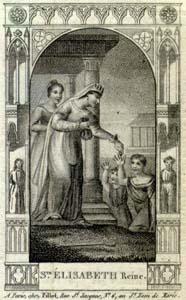
Having always felt bad for St Elizabeth of Portugal, whose feast falls on the same day as the American fireworks display, I decided to look her up.
And what an amazing woman! Daughter of royalty, wife of a king, mother of kings, she made peace. Quite truly, she made peace. She reconciled warring factions, warring relatives, even warring armies. She made peace.
How did she do this? She must have presented a formidable front or argued with a mighty wit, so one would think, a veritable Katherine Hepburn sort. I don't know: but I did read this--that she prayed, that she lived the evangelical call in her royal life, that she lived as a Franciscan tertiary after her husband's death, that she devoted her generosity to the poor and even to her husband's illegitimate children. Living a life in response to Jesus' call--that was her strength.
As one hagiographer writes, "Her birth had been peace, her work had been peace, and for peace she gave her life."
So truly, hers is a Feast fitting for the Fourth, for us. Today, no less than in the 13th,14th century in Portugal. And Peace--the Peace that comes from the King of Peace--is our calling too.
Sunday, July 03, 2005
A Touch of the Johannine in the Synoptic
 Scripture scholars, for all their learning, fail to find what's there on the page. They talk of Q and the Q Community. They talk of redaction and reduction. They talk of the Synoptic Problem and the Johannine Jesus. They talk. And they find only reduction and problem. They fail to read. Read today's Gospel from St Matthew: Jesus says, "I give praise to You, Father, Lord of heaven and earth, for although You have hidden these things from the wise and the learned You have revealed them to little ones. Yes, Father, such has been your gracious will." And then, as if just to throw a wrench into the wheels of Q theorists, Synoptic problem-solvers, and Johannine reductionists, Jesus says, "No one knows the Son except the Father, and no one knows the Father except the Son and anyone to whom the Son wishes to reveal Him." A little touch of the Johannine Jesus in the midst of the Synoptic Problem! Maybe there's no problem to reduce. Probably there was no Q. Certainly there was no Q community. But there's a Gospel According to St Matthew, and there's a Jesus, and He is God-made-Man, and He tells us most assuringly, "Come to me, all you who labor and are burdened, and I will give you rest. Take my yoke upon you and learn from me, for I am meek and humble of heart; and you will find rest for yourselves. For my yoke is easy, and my burden light."
Scripture scholars, for all their learning, fail to find what's there on the page. They talk of Q and the Q Community. They talk of redaction and reduction. They talk of the Synoptic Problem and the Johannine Jesus. They talk. And they find only reduction and problem. They fail to read. Read today's Gospel from St Matthew: Jesus says, "I give praise to You, Father, Lord of heaven and earth, for although You have hidden these things from the wise and the learned You have revealed them to little ones. Yes, Father, such has been your gracious will." And then, as if just to throw a wrench into the wheels of Q theorists, Synoptic problem-solvers, and Johannine reductionists, Jesus says, "No one knows the Son except the Father, and no one knows the Father except the Son and anyone to whom the Son wishes to reveal Him." A little touch of the Johannine Jesus in the midst of the Synoptic Problem! Maybe there's no problem to reduce. Probably there was no Q. Certainly there was no Q community. But there's a Gospel According to St Matthew, and there's a Jesus, and He is God-made-Man, and He tells us most assuringly, "Come to me, all you who labor and are burdened, and I will give you rest. Take my yoke upon you and learn from me, for I am meek and humble of heart; and you will find rest for yourselves. For my yoke is easy, and my burden light."
Saturday, July 02, 2005
Mary--the Exemplar of Beauty
 Tolkien once wrote, in a 1953 letter to the Jesuit priest Robert Murray, that the Blessed Virgin Mary was for him the exemplar of all aesthetics: "Our Lady . . .upon which all my own small perception of Beauty both in majesty and simplicity is founded." I think we might take him at his word--and explore how Mary is beautiful. From her immaculate conception through her glorious assumption, how is Mary God's perfect Work of Art? And we might look at this question by gazing at the mysteries of her life, one by one, and in connection to each other, in order to get a glimpse of that perfect Beauty. And we can do so by contemplating her figure in Scripture, in her Feasts in the Church's liturgy, in the poetic praises of the Fathers, in the mysteries of the Rosary, and in the blue & gold of the imaginations of Christian artists. Beholding, lovingly, and for a long time, this beautiful painting by the Blessed Fra Angelico, would offer us a first eloquent moment of such rapture.
Tolkien once wrote, in a 1953 letter to the Jesuit priest Robert Murray, that the Blessed Virgin Mary was for him the exemplar of all aesthetics: "Our Lady . . .upon which all my own small perception of Beauty both in majesty and simplicity is founded." I think we might take him at his word--and explore how Mary is beautiful. From her immaculate conception through her glorious assumption, how is Mary God's perfect Work of Art? And we might look at this question by gazing at the mysteries of her life, one by one, and in connection to each other, in order to get a glimpse of that perfect Beauty. And we can do so by contemplating her figure in Scripture, in her Feasts in the Church's liturgy, in the poetic praises of the Fathers, in the mysteries of the Rosary, and in the blue & gold of the imaginations of Christian artists. Beholding, lovingly, and for a long time, this beautiful painting by the Blessed Fra Angelico, would offer us a first eloquent moment of such rapture.
Friday, July 01, 2005
Subscribe to:
Comments (Atom)

